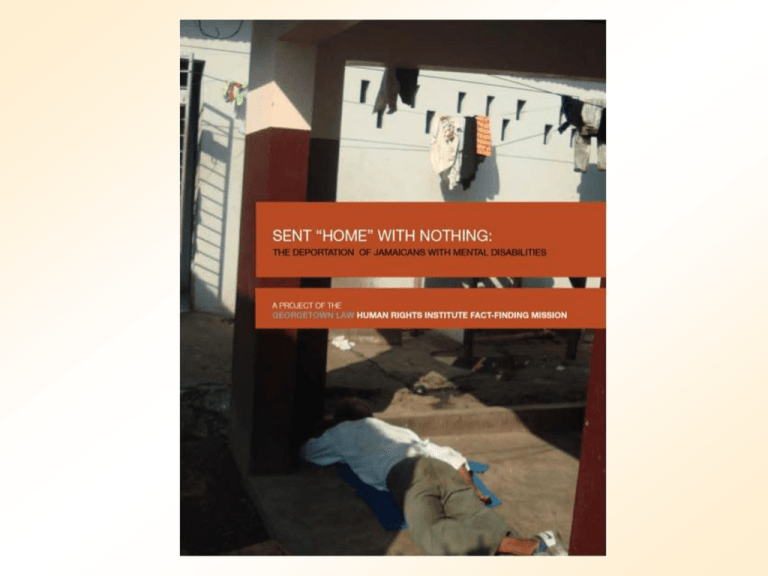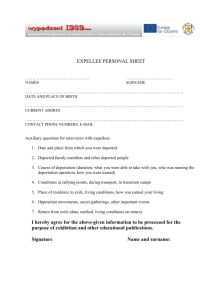Document 15141746
advertisement

QuickTime™ and a decompressor are needed to see this picture. Right to Health Everyone has the right “to the enjoyment of the highest attainable standard of physical and mental health.” International Covenant on Economic, Social and Cultural Rights art. 12, ¶ 1, opened for signature Dec. 16, 1966, 993 U.N.T.S. 3. Right to Health: Findings Deported persons with mental disabilities face many obstacles to the highest attainable standard of health, including: • • • Access to Medication Access to Medical Records Access to Medical Treatment Right to Health: Recommendations Provision of Medication Upon Deportation U.S. Immigration and Customs Enforcement (ICE) Health Service Corps should provide persons awaiting deportation with at least seven days of medication in appropriate dosages, pursuant to ICE/Enforcement and Removal Operations Medical Standards. Provision of Medical Records Upon receiving informed consent, all of the deported person’s medical records should be made available for review and analysis by medical professionals in the receiving country. Right to Housing “ … should not be interpreted in a narrow or restrictive sense which equates it with, for example, the shelter provided by merely having a roof over one's head ... Rather it should be seen as the right to live somewhere in security, peace and dignity.” U.N. Econ. & Soc. Council, Comm. on Econ., Soc. & Cultural Rights, The right to adequate housing (Art.11(1)): General Comment No. 4, ¶ 7, U.N. Doc. E/1992/23 (Dec. 13, 1991). Right to Housing: Findings Deported persons with mental disabilities are at high risk of homelessness due to: • Barriers to receiving family support • Stigma • Low socioeconomic status Right to Housing: Recommendations Family and Service Provider Notification of Departure U.S. Immigration and Customs Enforcement (ICE) should provide persons ordered deported the opportunity to notify family and/or Jamaica-based service providers of the impending deportation. If the date of deportation changes, ICE should provide another opportunity to inform their families of the new departure date. Securing Housing U.S. Immigration and Customs Enforcement (ICE) should work to identify available, accessible, habitable, and affordable housing options in the receiving country. ICE should assist persons with mental disabilities secure appropriate housing before they arrive in the receiving country. Right to Work “States Parties recognize the right of persons with disabilities to work, on an equal basis with others; this includes the right to the opportunity to gain a living by work freely chosen or accepted in a labor market and work environment that is open, inclusive and accessible to persons with disabilities….” Convention on the Rights of Persons with Disabilities art. 27, ¶ 1, opened for signature Dec. 13, 2006, A-44910 Right to Work: Findings Deported persons with mental disabilities face many barriers to employment, including: • Lack of adequate support services to train, certify, and properly prepare persons with mental disabilities for employment • Dual stigma creates barriers to the accessibility of the labor market • High risk of exploitation and unequal wages Barriers to Employment Programs in Jamaica for Deported Persons • While some employment/certification programs exist (e.g. HEART/NTA, Hibiscus)… • They are limited in mandate, funding, scope • The cost of entering job training and certification programs can be prohibitive • Unlike U.K., U.S. does not provide funding for job training programs • Training programs do not always accommodate individuals with mental disabilities • Few support systems exist in the workplace to enable different sectors to employ the mentally disabled • Difficulties physically accessing programs (transportation, etc.) Right to Work: Recommendations Formal Recognition of Training and Education U.S. Immigration and Customs Enforcement (ICE) should provide persons in detention access to information to regarding any employment certification requirements in the receiving country. ICE should also provide logistical and financial support to reduce the barriers that mentally disabled persons face in obtaining such certification. Vocational and Technical Training USAID, the appropriate U.S. Embassy or consulate, and local NGOs should collaborate to support programs that train and educate deported persons to perform in the local workforce. Such programs should be tailored to the needs of persons with mental disabilities. Obtaining Employment USAID, the appropriate U.S. Embassy or consulate, and local NGOs should assist deported persons with mental disabilities in finding employment in the receiving country. This includes building relationships with local businesses as well as funding and supporting organizations that assist deported and mentally disabled persons with obtaining employment and adjusting to the local work culture. Memorandum of Understanding An MOU between the U.S. and Jamaica would promote communication, transparency and a sense of ongoing, shared responsibility for human rights protections. It would address concerns such as: • securing personal identification documents • provision of medical records, medical care, and medication • ensuring safe and secure travel logistics • providing access to U.S. bank accounts and wages arising out of work at the detention center United States-Funded Reintegration Programs U.S.-funded Reintegration Programs in Haiti, Guyana, and El Salvador provide services such as: • • • • • • • • • • • meeting individuals at the airport hygiene packages temporary residential facility assistance with obtaining national identification reducing stigma psychosocial support substance abuse rehabilitation vocational training micro-credit loans family reunification (children) education (children) U.K. Programs The United Kingdom offers several programs and services to individuals deported from the U.K. to Jamaica, including: • coordination of mental health treatment, including ensuring the transfer of medical records & up to one month of medication • residential women’s shelter • job training & placement • certification recognition assistance • assistance with obtaining identification • financial assistance for housing and small businesses • residential drug treatment The Facilitated Return Scheme has saved the government an estimated US$22.6 million a year in prison and detention center costs, as well as in casework support and legal aid costs. “The British government considers that we’ve got a responsibility to deportees. We’ve got … a responsibility to integrate them.” - British High Commission official Complementary Protection Complementary protection is recognized in at least twenty-eight countries, including European Union member states and Canada. The Department of Justice should bring the United States into compliance with this obligation and establish procedures to determine whether complementary protection is warranted, pursuant to an individualized assessment of serious harm. Serious harm shall include serious human rights violations, including violations of the right to adequate mental health care. “Ask if the services are available here. [American] lawyers make the case that it is sometimes inhumane to send people back—and it is.” -Bernard Headley, Professor of Criminology at the University of the West Indies at Mona

